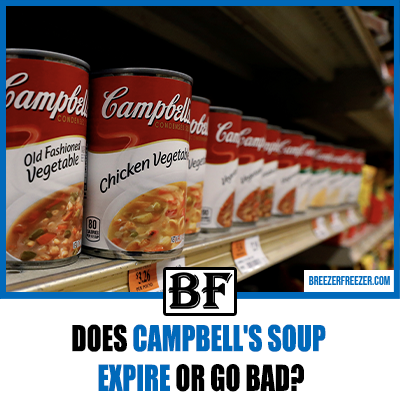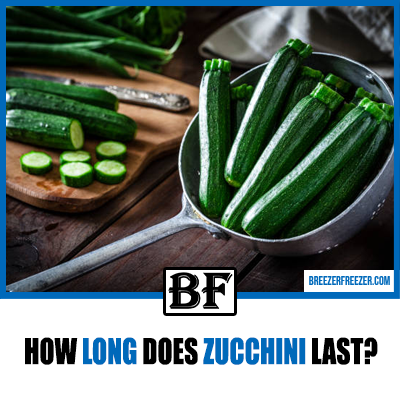Does Campbell’s Soup Expire or Go bad?
Canned foods have been around since 1890 in response to the French government to preserve food for armies and navy personnel.

Today canned food is everywhere we go delivering tasty meals that are cheap, nutritious, and convenient; but what is the shelf life of canned food, particularly Campbell’s soup?
If you are concerned about Campbell’s soup’s longevity, this article is for you. We will dive into the facts and let you know if your passed best-before-date soups can still be consumed safely.
Let’s get into it.
How long is Campbell’s soup good after the expiration date?
Some factors vary the lifespan of canned goods, and the ph level should be close to neutral for the best results. Acid foods last a shorter time in cans, but the overall lifespan is still impressive.
The temperature cans are stored at is also somewhat critical to the shelf life of the can. Cans should be stored under 70℉. Storing cans above this temperature can cause the cans to swell and even puncture, allowing bacteria to enter the can.
If your can of Campbell’s soup is in good condition, you can expect the contents of the can to still be good after two to three years and longer.
Is the date on Campbell’s soup an expiry date?
The date is not an expiry date. Best before dates are advisories that let the consumer know that the product is at its best before or on the date.
Providing the product is stored correctly, you can go a long way past the best-before date before the product spoils or goes bad. There are suggestions that a can of Campbell’s soup could last indefinitely.
However, you would expect the soup to degrade in some ways, like loss of nutritional value and even a color change, but this would not render the soup inedible.
Does Campbell’s soup have preservatives to extend shelf life?
Campbell soups don’t use preservatives of any kind to extend the shelf life of the product. The company’s ethos is more vegetables only. However, Campbell’s soup does tend to be high in salt content.
The shelf life is extended through a mechanical process of cold pasteurization, known as high-pressure pasteurization (HPP).
You may think of pasteurization as adding heat to the product to kill off bacteria. But Campbell’s and other food companies use a recommended and approved by the USDA HPP process, which uses high-pressure tap water to denature bacteria, effectively killing it off.
It is technical and takes time to explain, but if the USDA approves it, you can rest assured it works perfectly.
How long can you eat Campbell’s canned soup after the expiration date?
We need to take a step back in time to 1890, when canning was invented. The main reason for the invention was to be able to feed armies and the navy nutritional foods while on the move. The food had to be stable and not require input other than opening the can to be eaten safely.
Fast forward to 2022, the premise is much the same, but Campbell is now feeding consumers, not military personnel.
Making a food shelf stable is an intelligent thing to do. It prevents the food from going bad and gives the food product incredible shelf life.
Cans, unlike dry foods, don’t go stale and develop a stale flavor profile that may not be harmful but is unpleasant and unpalatable for anyone.
Canned foods are not tainted by other products like fish and meats that are turning bad.
So, to answer the original question, you can eat Campbell’s soup easily two years after the best before date.
What are the negatives of canned soups?
Despite being shelf-stable canned foods use valuable resources such as steel. Cans are heavy to carry around with you, so having a backpack full of Campbell’s soups as you assault an entrenched enemy position may have caused you to slow down considerably.
In reality, it is not such a negative aspect as we transfer shopping from trollies into the car’s trunk.
The biggest negative with canned goods is storage and dented cans, don’t be tempted to buy dented cans. A slight fracture in the can will cause the contents to spoil quickly.
Canned foods are susceptible to temperature, especially temperatures over 70℉, which can cause the can to expand to break its seams, rendering the content useless.
Why does canned soup last so long?
There is no need to fill canned soups with preservatives, the products are all-natural, and the bacteria are destroyed during the canning process, which makes the canned soups shelf stable.
In essence, canned soups do not have an expiry date, but the contents degrade over time. This is why there is a best-before date.
As a rule of thumb, don’t keep your canned foods for more than two years.
How long are canned goods really good for?
The contents of the can have some bearing on the product’s shelf life. To explain further, Campbell’s tomato soup could be considered a soup with high acid levels (remember no preservative), which will shorten the canned soup lifespan by around 18 months.
Other canned soups, say with low acid, veggies, and meat, will last considerably longer, like 2 to 5 years.
If your canned soup is stored correctly where there is no moisture to create a rusting can, and there are no dents or swelling cans, your Campbell’s canned soup could have an indefinite life span and be ok after many years of storage.
If you check online, there are videos of cans of Campbell’s soup being opened after almost 30 years, and the product is fine.
It is a testament to how good Campbell’s canning process was and is.
Can you get botulism from expired canned foods?
If your can is not rusty, dented, or swollen, your canned soup should be in good shape and contain nothing more than the good food the day it was canned.
But don’t always be over-sure of yourself or yourself or the canned soup, the slightest fracture can let bacteria into the canned food, and yes, botulism can take hold. It’s probably the worst food toxin we know, so be careful.
However, if your canned soup has a slight fracture, you should be able to notice something is a miss when you open the canned soup. Campbell”s soup is condensed and resembles a solid gloop like animal feed when poured from the can.
If they can fracture, the product would at least be dehydrated, so you will know not to eat it. There will be a smell and even mold growing inside the can, and this is the time to throw the canned soup in the bin.
If there is good news about botulism, it is killed by heat. The heat of you cooking your canned soup for 5 minutes will destroy botulism.
How do you know if Campbell’s canned soup has gone bad?
If you have canned soup past the expiry date, it’s generally not a problem, so there is no need to dispose of the food. If canned foods are damaged, there are typical signs of seepage from the can; maybe the labels or can itself is stained. If you see this, throw the canned soup away.
If your canned soups are free from rust and dents and are not swollen, you can move to the next step, opening the can.
A little anxiety will be expected when you open Campbell’s soup after many years, but don’t worry. Tell-tale signs will tell you whether your canned soup is bad.
Can opener in hand make the first puncture in the canned soup? If there is a hiss and liquid squirting from the puncture, you have a problem and should dump the can without going any further.
Canned soup can smell a little different when new, almost like pet food, if the can contains meat. Remove the can lid carefully. If the canned soup smells funky, then dispose of the soup.
After a visual inspection, you may notice that the canned soup is not the color you expected if it has passed the expiry date. This is not an issue. It’s acceptable as the canned soup will have degraded slightly, including color and nutrients.
Next comes the taste test. Nominate your most irritating child or the man of the house to be the first to enjoy this vintage canned soup.
Cook the soup on high heat for at least 5 mins and keep stirring it so it is heated evenly.
Your Campbell’s soup should taste like soup, and it will taste like soup.
How do you prevent your soup from reaching the expiry date?
You can use some simple stock management controls like don’t buy so much canned soup in one shopping trip and regularly rotate the cans from the back of the kitchen cabinet to the front.
How long can opened soup last in the fridge?
When it comes to storing soup in the fridge, it’s important to know how long it can last before going bad. Generally, an opened can of soup can last for up to 4-5 days in the refrigerator if stored properly.
To ensure the longest shelf life, make sure to transfer the soup to an airtight container before storing it in the fridge. Additionally, it’s important to keep the soup at or below 40 degrees Fahrenheit to prevent the growth of harmful bacteria.
However, it’s always best to use your own judgement and do a smell test before consuming the soup. If it smells off or has any visible signs of spoilage, it’s best to discard it. Remember, it’s better to be safe than sorry when it comes to food safety.
Thats it for this post.
Remember, If you only use part of a can of soup, place the remainder in an airtight container in the fridge. It will last for three to five days; after this time, dispose of the soup.





